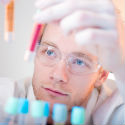UR CTSI’s Academic Research Track: Turning Medical Students into Medical Researchers
Over the past several decades, concerns have risen about the declining population of physician-scientists, with reports pointing to early career training and support as a possible solution. The UR CTSI Academic Research Track, which allows medical students to try their hands at research, has helped two University of Rochester School of Medicine and Dentistry students take the next step toward a research career: joining an MD-PhD program.
The pair, Ian De Andrea-Lazarus and Samuel Weisenthal, joined the University of Rochester Medical Scientist Training Program after finishing their Academic Research Track projects. This is a move that a new study from the Association of American Medical Colleges suggests will help them stay in science. The study tracked MD-PhD program graduates over 50 years and showed that most stuck with their research careers.
Ian and Sam explain what drove them to pursue a career as physician-scientists.
Why did you join the UR CTSI’s Academic Research Track?
Ian: I’ve always craved knowledge and enjoy the challenge of pushing the boundaries of existing human knowledge. I had several years of research experience before applying for medical school - as an undergraduate research assistant in the Linguistics Department at Gallaudet University and as a post-baccalaureate fellow at the National Cancer Institute. For two years, I worked in the Laboratory of Cancer Biology and Genetics at NCI, studying a non-selective cation channel found mainly in the peripheral nervous system that is involved in the transmission and modulation of pain.
Sam: Like Ian, I was inspired by my time as a post-baccalaureate trainee at the NIH, where I worked for a year in a computational radiology lab. I also had a great time doing a summer research project in health informatics at Rochester. I joined the Academic Research Track because I wanted to study the vast amount of data being collected through the electronic health record. In a single year, the University of Rochester Medical Center alone accrues more than two terabytes of non-image data (a lot). I was particularly interested in how this data could be used to predict – and hopefully help prevent – adverse health events in patients.
How did your experience in the Academic Research Track drive you to join the University of Rochester Medical Scientist Training Program?
Ian: I had originally wanted to apply for the University of Rochester Medical Scientist Training Program but I was afraid that my application would not be competitive enough. The Academic Research Track was the bridge that allowed me to pursue my goal of becoming a physician-scientist and reinvigorated my interest in research. The program allowed me to obtain a master’s degree in Public Health along with the tools and drive I needed to apply for the MD-PhD program.
Sam: I had also previously considered an MD-PhD program, but did not have a cohesive story to tell in an application. The Academic Research Track year allowed me to obtain a master’s degree in Data Science from the Goergen Institute for Data Science at the University of Rochester, which provided a foundation for more advanced study. It also helped me discover the UR CTSI’s Translational Biomedical Science PhD Program, which was a good fit, and to fully engage in a research project in a great lab.
What did you study during the Academic Research Track program?
Sam: We were initially interested in predicting readmission to the intensive care unit, which is a quality metric used by some hospitals. Ultimately, however, we decided to focus on predicting acute kidney injury, which is common, deadly, and sometimes completely preventable with simple interventions like fluid administration or medication review. Insights from our studies could be used to hopefully develop a better predictive tool that could help prevent acute kidney injury in the future.
Ian: We explored the association between low levels of lead in the serum of 3- to 5-year-old children and their mental capacity to focus attention, remember instructions, and juggle multiple tasks. We used a well-characterized tool for assessing these mental executive functions in children, called the Stroop day-night task, but found that the tool may not be sensitive enough to detect lead’s effects on neurodevelopment.
What are you studying now?
Sam: I am pursuing a joint degree between the Translational Biomedical Science PhD Program and Computer Science Department, with Computer Science as a minor. This includes select coursework in computer science, biostatistics, and medicine. My research focus is a continuation of my Academic Research Track project with Martin Zand, Ph.D., co-director of the UR CTSI and professor of Nephrology and Public Health Sciences at the University of Rochester Medical Center. Our goal is to improve acute kidney injury prediction by reformulating the standard approach and performing more rigorous error analysis. Ultimately, we hope to squeeze maximal predictive value out of electronic health record data to assist physicians in making the best decisions for at-risk patients.
Ian: I am pursuing a doctoral degree in the UR CTSI’s Translational Biomedical Science PhD Program and working with John Foxe, Ph.D., Killian J. and Caroline F. Schmitt chair of Neuroscience, and Edward Freedman, Ph.D., associate professor of Neuroscience, on a mobile brain/body imaging (MoBI) study. We are interested in understanding how the brains of people with decreased cognitive function, like those with Alzheimer’s disease, handle the cognitive demands of multitasking while walking, which requires continuous processing of information about the environment and body position.
###
The UR CTSI's Academic Research Track Program is supported by the University of Rochester CTSA awards (TL1 TR000096 and TL1 TR002000) from the National Center for Advancing Translational Sciences of the National Institutes of Health. The Academic Research Track Program allows first, second and third year medical students to take a year out from their medical training to gain research experience.
Learn more about the Academic Research Track Program and check out a list of current and past trainees.
Michael Hazard | 5/16/2018



